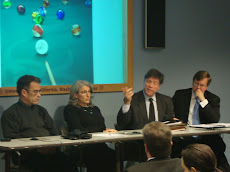Nor will the plant's cutting-edge technology do much to solve one of the biggest problems vaccine makers have faced in churning out this year's swine-flu vaccine: a slow-growing virus. High-speed techniques that bypass the lengthy and onerous process of incubating viruses to make vaccine are years away... It isn't clear how many benefits cell-culture technology will offer. A spokeswoman for Illinois-based Baxter International Inc. said the company's cell-culture plant in the Czech Republic—one of the first large-scale cell-culture facilities—initially experienced the same difficulty growing the H1N1 virus that egg-based plants did.Even when the new Novartis plant is up and running, flu viruses that grow slowly in eggs, as does the current H1N1 virus, may also grow slowly in cells, meaning production may not be much faster, scientists warn.
Cell-culture technology "is not the end game for us," said Anthony Fauci, director of the U.S. government's National Institute of Allergy and Infectious Diseases. His institute is spending $262 million this year on influenza research, including research on a new generation of vaccines that can be made without having to grow a virus...
The government began investing heavily in flu vaccine after the outbreak of avian flu in 2003, and then a shortage of seasonal-flu vaccine in 2004 when a large manufacturer [later bought by Novartis--Nass] suffered a contamination problem. HHS has put $1.56 billion into cell-based projects like the new Novartis plant...
An oversupply of flu vaccine on the U.S. market in the past three years has pushed prices down 30% to 40%, "creating a strong disincentive for manufacturers to maximize or even maintain current production capacity for the U.S. market," Vas Narasimhan, president of Novartis Vaccines USA, said in written testimony submitted for a congressional hearing last week. [Is this what is driving vaccine mandates?--Nass]... Other companies have had mixed results with cells. GlaxoSmithKline PLC of the U.K. received a $274 million HHS contract in 2007 to develop cell-culture vaccine and to build manufacturing capacity for it, but in an interview in September, the head of the company's vaccine business said the technology is about a decade away from being "mature" enough for use. "GSK will be in cell-culture technology perhaps in ten years, but not today," Jean Stephenne, the Glaxo official, said.
France's Sanofi-Aventis, the world's largest flu-vaccine maker, has also cast doubt on the immediate usefulness of cell-culture technology. In an interview in April, Sanofi's chief executive said the sticking point was designing the right kind of cells. "We just haven't actually found the right cell lines that do what we need them to do," he said."We're still several years away from cell-based flu vaccines," he said.
Monday, December 14, 2009
Vaccine Makers Struggle to Speed Output: Cell-Culture Technology Hastens the Process, but Slow-Growing Virus Remains a Problem
From the Nov. 25 WSJ: Cell culturing vaccines is not a well-developed technology, and may not shave much time off vaccine production.
Subscribe to:
Post Comments (Atom)










No comments:
Post a Comment